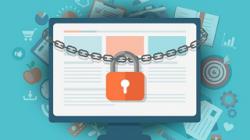Consumers Increasingly Paying the Ransom
Posted by: Timothy Weaver on 04/14/2017 03:15 PM
[
 Comments
]
Comments
]
Consumers are increasingly being targeted by cyberthieves with ransomware.
 A study, conducted by cybersecurity firm Trustlook, found that not only are consumers being targeted, but that they are paying up. 38% are paying the usual $100-500 ransom.
A study, conducted by cybersecurity firm Trustlook, found that not only are consumers being targeted, but that they are paying up. 38% are paying the usual $100-500 ransom.
The study also found that 45% of consumers don't even know what ransomware is.
“Ransomware is malicious software that locks all files on a targeted computer or network until the owner pays the ransom,” the firm said. “While it’s true that hackers may have more to gain from large organizations, experts say they see consumers, with their lack of sophistication in security, as lower-hanging fruit. Because consumers usually have fewer information security resources than large organizations, breaches are far easier to achieve and are more likely to have a meaningful impact, and thus are more likely to result in a payment.”
Most ransomware is delivered via phishing attacks and consumers are ill equipped to deal with it. One quarter (23%) of consumers do not backup the files on their computer or mobile device.
Allan Zhang, co-founder and CEO of Trustlook, has advice to consumers who might be concerned about being infected with ransomware: “Backup your data to multiple devices, and to at least one device that is not connected to a network. Also, be cautious of emails by checking the sender’s email address before clicking any link.”
Source: Info" onclick="window.open(this.href);return false;">https://www.infosecurity-magazine.com/news/38-of-consumers-pay-up-to/?utm_source=dlvr.it&utm_medium=twitter" onclick="window.open(this.href);return false;">Info Security
 A study, conducted by cybersecurity firm Trustlook, found that not only are consumers being targeted, but that they are paying up. 38% are paying the usual $100-500 ransom.
A study, conducted by cybersecurity firm Trustlook, found that not only are consumers being targeted, but that they are paying up. 38% are paying the usual $100-500 ransom.The study also found that 45% of consumers don't even know what ransomware is.
“Ransomware is malicious software that locks all files on a targeted computer or network until the owner pays the ransom,” the firm said. “While it’s true that hackers may have more to gain from large organizations, experts say they see consumers, with their lack of sophistication in security, as lower-hanging fruit. Because consumers usually have fewer information security resources than large organizations, breaches are far easier to achieve and are more likely to have a meaningful impact, and thus are more likely to result in a payment.”
Most ransomware is delivered via phishing attacks and consumers are ill equipped to deal with it. One quarter (23%) of consumers do not backup the files on their computer or mobile device.
Allan Zhang, co-founder and CEO of Trustlook, has advice to consumers who might be concerned about being infected with ransomware: “Backup your data to multiple devices, and to at least one device that is not connected to a network. Also, be cautious of emails by checking the sender’s email address before clicking any link.”
Source: Info" onclick="window.open(this.href);return false;">https://www.infosecurity-magazine.com/news/38-of-consumers-pay-up-to/?utm_source=dlvr.it&utm_medium=twitter" onclick="window.open(this.href);return false;">Info Security
Comments






